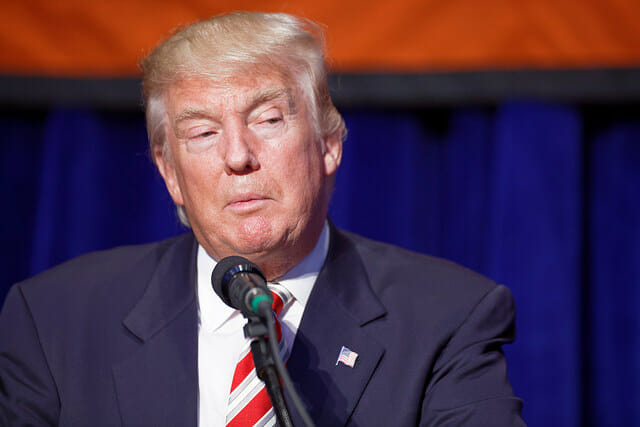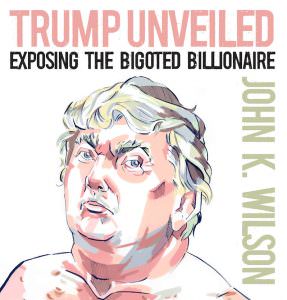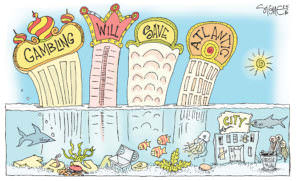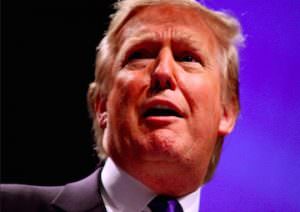Bombshell Report Exposes Decades of Trump Tax Evasion
Several of the real estate family's schemes and deceptions amount to "outright fraud," according to the New York Times. Michael Vadon / Flickr
Michael Vadon / Flickr
This is a developing story and may be updated.
Undermining the narrative President Donald Trump has aggressively promoted of his success as a “self-made” billionaire—the platform upon which he has built his success as a business mogul as well as his campaign for president in 2016—the New York Times released an explosive in-depth report on Tuesday detailing schemes which allowed Trump to avoid paying taxes on wealth that was transferred from his parents to himself and his siblings.
The “dubious tax schemes” Trump helped coordinate include cases of “outright fraud,” according to the Times.
Trump has for years been fond of telling audiences that through hard work and financial know-how he was able to transform a single $1 million loan from his father, Fred Trump, into a $10 billion fortune—a tale that made him a popular figure with those who voted for him in 2016.
But the Times reveals that based on 100,000 pages of financial records—including 200 pages of Fred Trump’s tax returns and those of the Trump empire’s partnerships—and interviews with Fred Trump’s former associates, Trump has received the equivalent of $413 million in 2018 dollars from his father’s real estate empire—starting “when he was a toddler and continuing to this day.”
Contrary to Trump’s preferred origin story, the Times revealed that Fred Trump lent his son at least $60.7 million to help him fund his business ventures—equivalent to $140 million in today’s dollars. While Trump has claimed he had to pay the initial loan back “with interest,” tax returns show most of the money was not repaid.
There you have it: Donald Trump is no self-made man, he was a millionaire at age 8 and only survived on his Daddy’s money. The Trump family grew richer by tax fraud. This is a profile of a world-class criminal family. #CriminalTrump https://t.co/o0qYjiLNNZ
— Carl Dunn (@CarlDunnJr) October 2, 2018
By setting up a fraudulent corporation through which Trump and his four siblings passed huge monetary gifts from their parents, they were able to avoid paying millions of dollars in taxes—just one of several tax schemes Trump helped orchestrate in order to enrich himself, as the Times reports:
Records indicate that Mr. Trump helped his father take improper tax deductions worth millions more. He also helped formulate a strategy to undervalue his parents’ real estate holdings by hundreds of millions of dollars on tax returns, sharply reducing the tax bill when those properties were transferred to him and his siblings.
“The Times‘s investigation of the Trump family’s finances is unprecedented in scope and precision, offering the first comprehensive look at the inherited fortune and tax dodges that guaranteed Donald J. Trump a gilded life,” wrote David Barstow, Susanne Craig, and Russ Buettner, the journalists behind the story. “The reporting makes clear that in every era of Mr. Trump’s life, his finances were deeply intertwined with, and dependent on, his father’s wealth.”
If this @nytimes bombshell is accurate, Trump isn’t a self made millionaire. He engaged in massive tax fraud to inflate his inherited wealth. Like most everything else he says, his “self made” story is a huge lie. Obama was right. Trump is a BS artist – now enabled by Republicans
— Wajahat Ali (@WajahatAli) October 2, 2018
Americans should know if the president is a tax fraud. @realDonaldTrump should come clean and immediately release his tax returns OR the Republican-led Congress should come back from its 6-week recess and vote to release them. https://t.co/Uwaw7uzUnn
— Rep. Eric Swalwell (@RepSwalwell) October 2, 2018
Do you know how high the bar is for the NYT to directly accuse someone, let alone a sitting president, of tax fraud, which is a federal crime? It’s very, very high. And here we are: https://t.co/WyDfI56LIo
— Binyamin Appelbaum (@BCAppelbaum) October 2, 2018
Your support is crucial…The President is a financial fraud, made none of his own money, was consistently bailed out by his dad, and conspired with his siblings (one of whom is a federal judge) to engage in (possibly criminal) tax fraud to inherit their wealth. https://t.co/oC0pxuepBb
— Asha Rangappa (@AshaRangappa_) October 2, 2018
With an uncertain future and a new administration casting doubt on press freedoms, the danger is clear: The truth is at risk.
Now is the time to give. Your tax-deductible support allows us to dig deeper, delivering fearless investigative reporting and analysis that exposes what’s really happening — without compromise.
Stand with our courageous journalists. Donate today to protect a free press, uphold democracy and unearth untold stories.




You need to be a supporter to comment.
There are currently no responses to this article.
Be the first to respond.